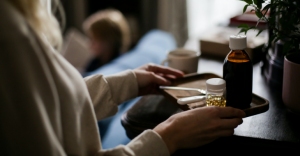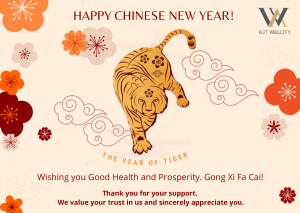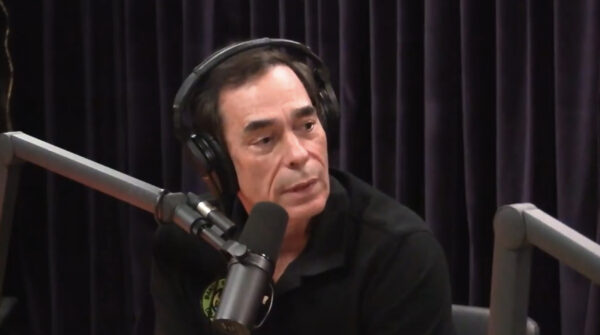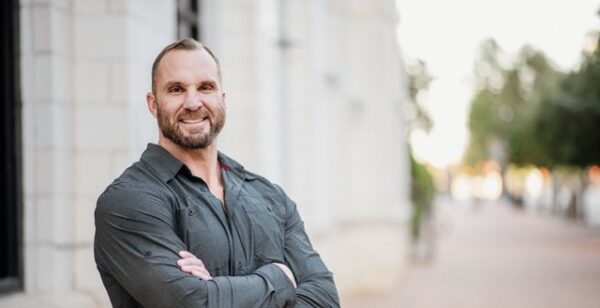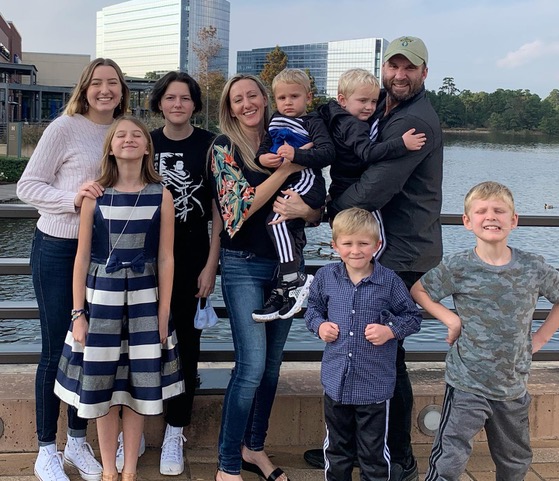Keen personal interest in wellness has helped Anthony Tan build a successful business where he can apply his beliefs.
At first sight, Anthony Tan doesn’t look much like his publicity photograph. His grey hair is short and in the stage of growing back after having been shaved. So are his eyebrows. The explanation? He recently spent some time ordained as a monk.
“The ordination programme was really the experience of a lifetime,” says the founder and managing director of AJT Wellity, a Thailand-based medical wellness consulting, development and management company.
Mr Tan was born a Roman Catholic and grew up in a strongly religious family. It never crossed his mind that he might one day gravitate toward the spirituality of Buddhism by spending some time in the monkhood. The turning point, he says, came when he fell into “quite a fair bit of depression and stress” in 2018.
He started off by going to iRETREAT, an institution devoted to wellness meditation, mindfulness and psychological wellbeing based in Pak Thong Chai district of Nakhon Ratchasima. It was founded by Phornsan and Praputt Kamlang-ek, who is known as Luang Pi Duke.
His first meditation programme lasted four days. “We had four sessions of meditation in a day,” Mr Tan recalls, staying he felt “relaxed and enclosed by the surroundings”.
He kept going back and forth to iRETREAT for a year. “I’ve learned to let go. I’ve learned to see things in a different manner,” the 58-year-old executive tells Asia Focus.
AJT Wellity has now partnered with iRETREAT to develop a programme focused on meditation and mental health. As a dedicated “walk the talk” person — as he puts it, “whatever I develop, I would like to try it out” — Mr Tan decided to pursue a more in-depth experience of the practice by joining Monk Life Thailand.
Monk Life Thailand is an ordination programme where individuals can obtain a comprehensive foundation in monastic practice and improve meditation practice over a 30-day period. The programme consists of five days of preparation for ordination, the ordination ceremony, and more than three weeks immersed in the life of a monk and cultivating good habits and discipline by practising meditation, going out on alms rounds and learning Dhamma.
Monk Life welcomes English-speaking individuals who wish to learn and understand Buddhism. As someone who had spent most of his life and career in the fast lane, Mr Tan says his journey at Monk Life was “extremely different” from what he was used to.
“It was really touched and emotional when I was ordained and when I got my hair shaved,” he says, recalling the time his family and loved ones accompanied him to witness the ceremony.
Being a Catholic means attending mass every Sunday, listening to priests and the gospel, and praying the rosary, but Mr Tan says he was looking for a different kind of spiritual experience. “I couldn’t reach into myself. I couldn’t find what I wanted, what was lacking in terms of my inner peace”. But the Catholic identity is something he will always have, and he still wears a simple silver cross around his neck.
Adopting the ways of a monk and experiencing that life, while also witnessing the lives of villagers in Pha Pae, Chiang Mai, where the Monk Life training is based, gave Mr Tan another perspective that the Church didn’t offer.
“Monk Life brought back the understanding of who I am, what I am missing and what I want,” he says. “I want basically to look for inner peace and stability in my mind and my thoughts. It touched me very deeply.
“I surely found inner happiness during those 21 days,” says Mr Tan. Now, he can meditate and keep absolutely still for an hour or two, and it has “brought me into the new era of my life”.
Mr Tan is now determined to apply knowledge from his mindfulness journey into the business model to help others, especially entrepreneurs and executives who struggle with stress and mental health issues and are unable or reluctant to speak up.

Anthony Tan, Founder and managing director, AJT Wellity Asia Co Ltd
WALKING THE TALK
Mr Tan has always been a hospitality guy. His career path didn’t start in a conventional way, like many other executives that have at least two degrees under their belts. His highest formal education was grade six, he says.
Starting work at the age of 14, Mr Tan worked his way up the career ladder. “I’m a very hands-on person. I worked my way up and as I went along, I started taking necessary courses in the hospitality field.”
After spending his early working life in Singapore, he was headhunted to Bangkok to serve as director of operations with TRIA, the medical wellness centre of Piyavate Hospital. Two and a half years later, Bumrungrad Hospital offered an irresistible challenge, as CEO of its Vitallife preventive medicine and anti-ageing business. “That’s something I wouldn’t want to miss.”
These two roles helped him broaden his knowledge in both the healthcare and hospitality sectors while also providing opportunities to build a strong network.
When his 50th birthday anniversary approached, Mr Tan decided the milestone deserved a change of course. “I thought, It’s time to be an entrepreneur.”
AJT Wellity was founded in Singapore in 2013 as a medical wellness service consultant and management company for the healthcare, hospitality and property development sectors. The company’s services include researching and designing concepts, executing and managing medical wellness programmes for clients and partners.
Apart from the link-up with iRETREAT, AJT Wellity operates three other brands: DrMap, Wellity and MEWE. All revolve around health and medical wellness.
DrMap focuses on designing, procuring and managing healthcare protocols for individuals and organisations. Wellity provides wellness services and consulting for the hospitality industry including resorts and hotels.
MEWE complements the portfolio by pushing the boundaries of urban health and wellness lifestyle clinics. Its goal is to cover the various elements of physical, emotional, social, environmental, occupational, intellectual and mental wellbeing.
In Mr Tan’s view, wellness is more than just a trip to the spa or a day of “pampering”; rather, “wellness is something that one needs to know where they are and what they want.”
“Wellness is looking at one’s inner health and wellbeing from top to toe and understanding how one would like to improve in terms of their health.”
In order to know what to improve, people have to examine themselves deeply to understand what factors are having an effect on them. It could be genetics, the immune system, hormone levels, or any number of others.
External factors also play a part in wellness as well — the air we breathe, the food we eat, the water we drink, or even the electronic devices we use.
Wellness certainly can be integrated with spa and pampering services to help people relax, but the core of wellness is understanding oneself and that includes the medical component. “Wellness is still scientific and evidence-based. It has to be there,” says Mr Tan.
So, when clients come in with a business model that is not 100% appropriate, what the company does is “hack their business model” by asking a set of questions: why do you need this, why this size, and what are you good at?
From there, the work begins from scratch. From designing the concept and operation flow to determining the pricing, setting up programmes, and then integrating the concept into the architecture of the building.
“We put the software before the hardware,” says Mr Tan. “We want to be unique and different. We don’t want to be another operator, but we want to be a hotel operator that is specialised in terms of real wellness and wellbeing.”
BEYOND THE BUZZ
Wellness has been a buzzword for years now but the global pandemic has caused it to resonate even more in the past two years. As a seasoned wellness and healthcare professional, Mr Tan offers insights into trends he is seeing.
“The industry is going to change. Hotels won’t be hotels anymore” because they are going to incorporate wellness into their operation according to travellers’ needs.
Functional medicine is also gaining momentum, he says, explaining that it’s an approach that looks for the root cause of the disease.
“Medical wellness will come into play, not only in treating but educating,” he points out.
In addition to hospitality and healthcare businesses, insurance companies also want to be in on the latest market trend. Many of them are already involved, says Mr Tan, since helping their policyholders lead healthier lives makes good business sense.
He believes meditation is one of the approaches people can use to deal with stress and mental health issues, but he fears that it is sometimes taught and used in the wrong way.
Some people might say meditation just involves closing your eyes and being still, and that’s it. They are not teaching how to control your mind and bring it back to the body, says Mr Tan. “You have to recite the mantra to clear your mind too.”
“Next, meditation is body posture,” notes Mr Tan — either sitting and lying down is all right as long as the body feels relaxed and comfortable.
He believes that having a monk, in his case an English-speaking monk, to educate and guide people in meditation methods is essential because it’s not just about sitting down, taking a deep breath and closing one’s eyes.
Mr Tan highlights the importance of being educated in choosing the most suitable wellness options. While the pandemic has made people understand how valuable it is to be healthy, it also had caused what he calls a “Black Friday” consumerism that prompts people to buy everything that is deemed wellness whether it’s vitamins or a spa package, without knowing why they need it.
With so many people these days getting most of their health information from “Dr Google”, as he puts it, “we don’t know what is right and wrong”.
Education from an ethical, reliable institution is therefore essential so that one can make a well-informed decision when choosing the right wellness and healthcare approaches.
TIME TO UNWIND
With so many projects in hand, Mr Tan hesitates when asked how he unwinds. “That’s a tough question,” he says, “I hardly do.
“I start working at 8am and I don’t finish until 8 or 9 o’clock at night” as clients and partners are in different time zones including Europe or the US.
“I find the only thing that unwinds me now is meditation,” he notes. But sometimes he opts for just staying home and watching the news, learning online courses, and doing walking exercises.
“I used to go to States every year to improve my education with doctors but now I can’t do that, so I read a lot,” he says. His go-to genres these days are mainly in the health and nutrition field. Intermittent fasting is one area that has attracted his curiosity.
“I think intermittent fasting is something that really benefits people and I have really experienced that with my life,” notes Mr Tan, recalling the monks’ principle of having only two meals a day.
Asked to reflect on his long career journey, Mr Tan says he is happy. “To be honest, I’m a very fortunate person — to have gone from having grade six (education) to be a CEO of a hospital.”
And when no one else believed he could come this far, he never lost faith in his ability and perseverance. “I believe why I am here is because I’m a people person. I believe that if I want to do something, I put my whole heart and soul into it. I listen. I speak. I learn. I mingle and I network.”
From being a waiter to becoming general manager of a yacht club to designing health and hospitality concepts and building hotels, Mr Tan has been an ardent on-the-job learner. There was a tome when he never read a blueprint and had no clue about architecture, but he worked hard to fill in the gaps.
“I know how to do a basic architectural design. I can read a blueprint. I can design. I can talk on the same level as an architect. I can talk on the same level as an engineer. I can talk on the same level with a doctor,” he says. “I can talk on the same level with a businessperson because I had my passion. I worked and I put my heart and soul into it. And each time I learn.”
Mr Tan is now taking a master’s degree in wellness. “I’m still struggling with writing my thesis,” he quips. “But I want to really learn, not just to hear fairy tales but I want to be able to read reports and basically help diagnose a certain level of symptoms.”
One of his next projects is to set up a non-profit organisation to provide scholarships to Thai doctors who need financial assistance to continue their studies. It is expected to be introduced later this year.
CREDIT: BANGKOK POST
NEWSPAPER SECTION: ASIA FOCUS
WRITER: PATTAMA KUENTAK


